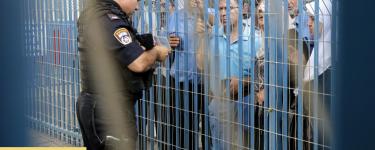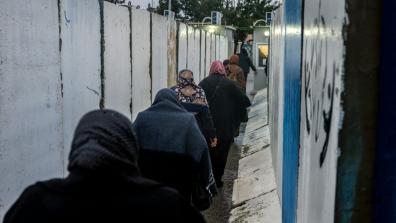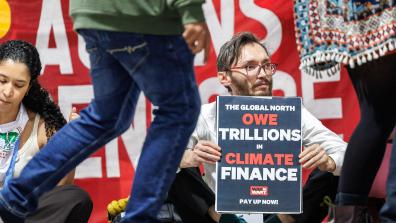End Israeli Apartheid

The crime of apartheid
War on Want has long recognised Israel’s system of domination, based on institutionalised, racial discrimination, as the crime of apartheid – as Palestinian activists, scholars and civil society organisations have been documenting for decades. Increasingly, international human rights organisations, UN officials, and legal experts, are all reaching the same consensus: that Israel is an apartheid state, as defined under international law.
Why do we refer to Israel as an apartheid state?
Israel and the occupied Palestinian territory constitute one territorial under full Israeli control. Yet under Israeli law, and in practice, Jewish Israelis and Arab Palestinians are treated differently in almost all aspects of life: housing, education, health, employment, family life, residence, and freedom of movement. Dozens of Israeli laws and policies institutionalise this system of racial discrimination and domination.
For example, in the occupied West Bank, Jewish Israeli settlers and Palestinians living in the same area are subjected to separate legal systems, with Jewish Israeli settlers governed by Israeli civil law, and Palestinians governed by Israeli military law, which is enforced by Israeli military courts – documented in War on Want’s 2021 report ‘Judge, Jury, and Occupier’.
In 1948, Israel declared itself a state. In the process, over 750,000 Palestinians were forcibly displaced, exiled or forced to flee from violence inflicted by militias, which later became the Israeli military. Palestinians call this the Nakba (‘catastrophe’). Israel refuses to allow Palestinian refugees to return home, a universal right recognised under international law. Israel’s colonisation of Palestine continues to this day, through the demolition of Palestinian homes, the expulsion of Palestinian communities and appropriation of their lands, and the expansion of illegal Israeli settlements in their place. Israel’s settler colonialism is serviced by its apartheid regime, designed to subjugate and fragment the Palestinian population through a complex web of institutionalised racial discrimination.
The Palestinian call for international solidarity: Boycott, Divestment and Sanctions
In 2005, a coalition of over 170 Palestinian civil society organisations, drawing on the legacy of the anti-apartheid movement in South Africa, called on citizens of conscience around the world to act through Boycott, Divestment and Sanctions (BDS) campaigns against Israel, until it complies with international law. BDS tactics provide a peaceful way for people to campaign for human rights, justice and accountability; and were used to successfully bring about the end of apartheid in South Africa. Leading figures from the South African anti-apartheid movement endorsed the Palestinian call, including the late Archbishop Desmond Tutu – as well as War on Want.
Today, in response to the growing call for justice, the UK government is proposing a law that would ban public bodies from boycotting companies involved in human rights abuses and environmental harms – a law specifically designed with Boycott, Divestment and Sanctions campaigns in mind. Anti-BDS laws demonstrate how governments around the world are complicit in allowing Israel to continue its oppression of the Palestinian people with impunity.
Silencing opposition to apartheid
International solidarity with the Palestinian people, through BDS campaigns, is crucial in the face of Israel’s attempts to shut down all forms of dissent to its apartheid regime. Israel targets Palestinians for opposition to apartheid, including through the deliberate killing, torture and unlawful imprisonment of Palestinian civilians. Throughout the past year, Israel has intensified its crackdown on protest, civil society and human rights defenders. In response to the mass Palestinian uprising in April-June 2021 – known by Palestinians as the ‘Unity Intifada’ – Israel embarked on the largest campaign of mass arrests against Palestinian citizens of Israel for decades. Over 2,100 Palestinians were arrested for protesting against Israel’s ethnic cleansing of Sheikh Jarrah, its police attacks on Al-Aqsa mosque, and aerial bombing of the Gaza Strip.
While international recognition of Israeli apartheid grows, Palestinian human rights defenders, such as War on Want’s partner organisation Addameer, are increasingly targeted by physical, legal, and reputational attacks, including smear and disinformation campaigns. These attacks come from Israeli authorities and politically motivated groups internationally – including in the UK. In October 2021, Israel escalated its targeting of Palestinian civil society by designating six leading Palestinian human rights organisations, including Addameer, ‘terrorist organisations’ – effectively criminalising their work. Such attacks are designed to delegitimise human rights work, silence opposition to Israel’s apartheid regime, and disrupt Palestinians’ access to justice, including in the International Criminal Court.
Alongside its attacks on Palestinian opposition to apartheid, Israel attempts to shut down international scrutiny; it has expelled human rights defenders documenting its abuses, refused entry to UN experts, and barred human rights groups, including War on Want, from entering Palestine.
Act now in solidarity
We must continue to oppose attempts to thwart opposition to Israel’s apartheid regime. The international movement against South African apartheid faced similar attacks, but the end of apartheid in South Africa was made possible by the international community’s continued solidarity. In Palestine, as in South Africa, War on Want has always stood alongside the oppressed. We know that, just as before, it will be the courage of those living under apartheid, alongside the efforts of countless activists around the world compelled to act by the force of injustice, that will end apartheid. Palestinians have never stopped demanding their freedom. We must support them: by building a movement of solidarity with the Palestinian people and compelling those in power to act.




